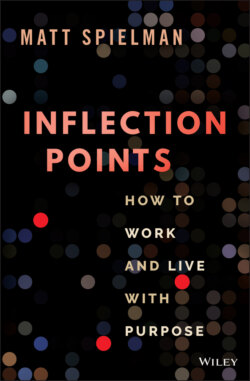Читать книгу Inflection Points - Matt Spielman - Страница 8
1 WHAT'S YOUR GAME PLAN?
ОглавлениеProfessional success often conceals a gnawing conflict at one's core—a vague but undeniable sense of lack, that something is askew, off-kilter, or out of place. Even as you pile up accomplishments and accolades, and ascend through the hierarchy of your field, a lingering question resonates in your mind like a ticking clock, or like the steady drip-drip-drip of a faucet as you lie awake in the still of the night: Is this really the life I am meant to be living? Is this the life I want? And if it's not, how do I get it?
Henry David Thoreau wrote in 1854 that “the mass of men lead lives of quiet desperation,”1 locked in a cycle of daily toil interrupted only by brief bouts of leisure that offer a momentary reprieve, but fail to address the frustrating feeling of existential befuddlement.
The world has changed since Thoreau's era, but the observation remains as incisive as ever, and it applies to people from all walks of life, from trades to top-tier executive positions. They know there's more they want to get out of life, whether it's more personal satisfaction, a more meaningful contribution to the world, more community connection, more financial security, more intellectual stimulation, or simply more free time to spend alone or with family. But each time they ponder how to find what it is they want—or to know with certainty what they want in the first place—self-doubt blocks action. Is it really possible to have a life and career that is engaging, gratifying, and satisfying?
I know this kind of angst is real because I see it in the clients I coach. I know it's real because I lived under the mantle of quiet desperation myself, for many years, until I realized my purpose in helping others find theirs.
In those days, if you looked at my life from the outside, you might assume I was completely satisfied. At the start of my professional career in 1997, I was working as a salesperson for a prominent investment bank. Although I was working among people much more experienced, I was holding my own, surrounded by all kinds of high achievers. It was a thriving, heady environment, and we were on the rise.
But I wasn't ready to settle in. Something deep inside of me had questions. I felt I could be doing something different. I lacked a sense of personal connection and satisfaction with how I was spending my time. And all around me I observed many others mired in the same grind. They were earning top salaries, but no matter how much they pulled in, the money wasn't rewarding. Some of my colleagues had an irrepressible enthusiasm for the work, but others were, like me, out of place—slogging through each day in anticipation of the next paycheck.
That Thoreau passage was one that came back to me over and over again. Working in that financial ecosystem, I saw a controlled kind of desperation all around me, and I started to understand that I did not belong there. To the contrary, I felt that my real calling in life was to help people escape that kind of desperation. I knew I could help people put their feelings into words, and move those feelings into action. My desire was to be someone who could energize individual lives and careers in a way that would electrify their existence with a clear-eyed passion and a strong intentionality.
My transition from finance to coaching was a long and winding road. I've had many positions in across several industries, and each has been a valuable step to get me to where I am today. There were aspects of my financial career that I enjoyed, but I knew it could not sustain me. A moderately fulfilling life was unacceptable to me. I had to step out of that very traditional job and experience my own setbacks and detours before I found what it was I was looking for. The realization that I had to get out of “the known” and step into “the unknown” was the first stride down what has been a transformative and invigorating path toward the work I do now.
